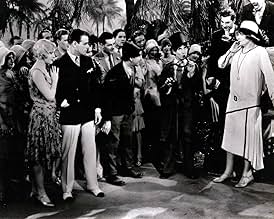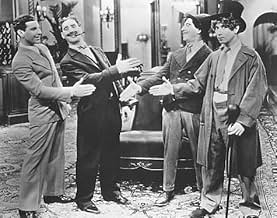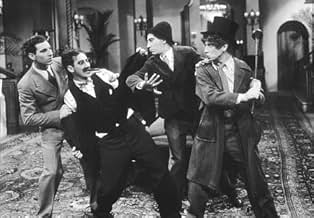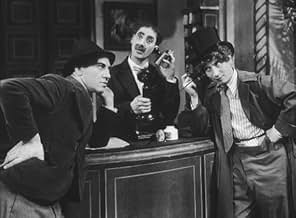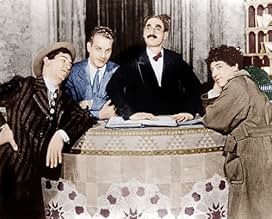CALIFICACIÓN DE IMDb
6.8/10
8.6 k
TU CALIFICACIÓN
Groucho es el director del hotel "Los Cuatro Cocos" que atraviesa dificultades. Debido a una quiebra, se procede a la subasta del hotel por parcelas, la cosa se complica con la llegada de Ch... Leer todoGroucho es el director del hotel "Los Cuatro Cocos" que atraviesa dificultades. Debido a una quiebra, se procede a la subasta del hotel por parcelas, la cosa se complica con la llegada de Chico y Harpo, y el robo de un valioso collar.Groucho es el director del hotel "Los Cuatro Cocos" que atraviesa dificultades. Debido a una quiebra, se procede a la subasta del hotel por parcelas, la cosa se complica con la llegada de Chico y Harpo, y el robo de un valioso collar.
- Dirección
- Guionistas
- Elenco
- Premios
- 2 nominaciones en total
Groucho Marx
- Hammer
- (as Marx Brothers)
Harpo Marx
- Harpo
- (as Marx brothers)
Chico Marx
- Chico
- (as Marx Brothers)
Zeppo Marx
- Jamison
- (as Marx Brothers)
Gamby-Hale Ballet Girls
- Dancers
- (as Gamby-Hale Girls)
Dolores Hope
- Dancer
- (sin créditos)
Sylvan Lee
- Bell Captain
- (sin créditos)
Barton MacLane
- Lifeguard
- (sin créditos)
- Dirección
- Guionistas
- Todo el elenco y el equipo
- Producción, taquilla y más en IMDbPro
Opiniones destacadas
A lot of people don't find The Cocoanuts to be as entertaining as some of the later Marx Brothers films. Maybe not, but it definitely comes close. Personally, I thought this was the Marx Brothers' fifth best film. It's not that it's bad, because it great, but it's just not as good as some of the others, that's all.
As several other people have said, it really doesn't stand up technically as well as most of the others, but that has nothing to do with the quality of the script, which is just great. I truly believe that if I had seen this in 1929, I would have been as hooked on the Marxes as I am now.
There are many great bits in this movie, including the first scene between Groucho and Chico, the Auction, the connected bedroom thing, and the first time we ever see Groucho do his thing with Margaret Dumont. But the only scene in this movie to make my personal Ten Best Marx Scenes is the Why-A-Duck routine. Genius, it's just pure genius. That's my only word for it.
Harpo really doesn't have a lot of good stuff in this movie. He's great in what he doesn't have, but he really shines in Monkey Business and Duck Soup. Those are his two best performances, if you ask me. If you are looking for classic Harpo, I'd suggest watching either of those. Also, Zeppo, obviously, has nothing to do. But then, what did you expect?
This movie has a few actually rather unfunny spots in it, but you can blame that on the fact that this is the brothers' first movie, and they are still getting used to the camera. But it has a lot more comedy than non-comedy and is still a whole lot better than most of the "comedies" that are coming out nowadays.
This may sound a little strange, but if you have never seen a Marx Brothers movie, I suggest watching this one first. It's a lot more enjoyable if you aren't expecting it to be equal to Duck Soup or Animal Crackers. Because it's not. But, as I can not stress enough, it is still worth checkout, and better than than anything they did post-A Night at the Opera.
Well, it's the Marx Brothers best movie of the 20's, anyway.
8/10
As several other people have said, it really doesn't stand up technically as well as most of the others, but that has nothing to do with the quality of the script, which is just great. I truly believe that if I had seen this in 1929, I would have been as hooked on the Marxes as I am now.
There are many great bits in this movie, including the first scene between Groucho and Chico, the Auction, the connected bedroom thing, and the first time we ever see Groucho do his thing with Margaret Dumont. But the only scene in this movie to make my personal Ten Best Marx Scenes is the Why-A-Duck routine. Genius, it's just pure genius. That's my only word for it.
Harpo really doesn't have a lot of good stuff in this movie. He's great in what he doesn't have, but he really shines in Monkey Business and Duck Soup. Those are his two best performances, if you ask me. If you are looking for classic Harpo, I'd suggest watching either of those. Also, Zeppo, obviously, has nothing to do. But then, what did you expect?
This movie has a few actually rather unfunny spots in it, but you can blame that on the fact that this is the brothers' first movie, and they are still getting used to the camera. But it has a lot more comedy than non-comedy and is still a whole lot better than most of the "comedies" that are coming out nowadays.
This may sound a little strange, but if you have never seen a Marx Brothers movie, I suggest watching this one first. It's a lot more enjoyable if you aren't expecting it to be equal to Duck Soup or Animal Crackers. Because it's not. But, as I can not stress enough, it is still worth checkout, and better than than anything they did post-A Night at the Opera.
Well, it's the Marx Brothers best movie of the 20's, anyway.
8/10
"The Cocoanuts" is the very first film the Marx Brothers did and is essentially a filmed recording of their Broadway triumph. Talkies were still in their infancy, and the technical aspects of this flick prove it! The camera can barely keep up with the boys as they leap around. But don't let the staginess and crummy musical interludes and subplots distract you... this film has some of the great moments in Marx comedy. Chico is especially aggressive with his lines (he just annoys the hell out of Groucho, foiling his plan to rig an auction with his denseness) and Harpo (with his original red wig, which films dark brown) has never been better, destroying the hotel lobby by eating buttons off bellboy's uniforms and swilling ink. Groucho has some of his most potent insults. Zeppo, surprisingly, has even less to do here than in subsequent outings. This film is hilarious and head-and-shoulders above their later MGM films like "Go West" and "At the Circus." Funny, funny, funny!
"The Coconuts", being the Marx Brothers' first film, is bound to be a little creaky. This does not mean you should miss it, however! Groucho delivers some of his most scathing one-liners, Harpo provides a perfect blend of devilry and sympathy, and Chico struts like a peacock. Even the fabulous Margaret Dumont gets in on the action, telling her warbling daughter to "stop singing on the beach at all hours" after one truly atrocious song. What brings this film down is bad editing and the godawful songs--Mary Eaton singing "Do the Monkey Doodle Do"--say WHAT!?!? The dancing is,as Groucho states, "A little entertainment--very little." And Harpo's harp solo was really just pasted in there. Stay away from the fast-forward button, though--the songs are just as laughable as the jokes(for all the wrong reasons, of course), as is Kay Francis's drag queen-esque performance. And don't miss the show-stopper "I want my shirt!" My sister and I were rolling on the ground laughing. The love couple is truly nauseating, but a touching moment is provided when the childlike Harpo comforts a heartbroken Mary Eaton. Full of vaudevillian jokes and biting one-liners, this is definitely a film no Marx Brothers fan should miss!
Contrary to popular belief, Cocoanuts was not the first Marx Brothers movie. That honor belongs to Humorisk, a silent film which no longer exists. It was greeted with such hostility that one master reel was burned, and the other deteriorated in a producer's closet. It is difficult to imagine Chico and Groucho in a silent film, and while one might envision Harpo as the ultimate silent comedian, his whistling and horn-honking formed an essential part of his act.
By 1929, however, sound was here to stay, and many silent comics suddenly found themselves out of work. In fact, the only two comedians to successfully make the transition from silent to sound were Laurel and Hardy (Chaplin didn't make his first sound movie until 1940, and was never comfortable with sound). Comedy teams like Stan and Ollie and the Marx Brothers needed dialog; even Harpo communicated with his brothers using broad gestures and the aforementioned honks and whistles.
The biggest story of 1929 (besides the stock market crash) was the Florida land boom. Mr. Hammer (Groucho) is the manager of a struggling hotel, trying to lure customers so that he can sell them Florida lots. Of course, Astoria, Long Island, where this movie was filmed, is not exactly the Sunshine State, and the opening tribute to "sunny Florida" shows us some sand poured on a sound stage to simulate a beach and a painted backdrop of palm trees and coconut. Groucho pursues the rich Mrs. Potter (Margaret Dumont), whose daughter Polly (Mary Eaton) is in love with Bob Adams (Oscar Shaw). Also interested in Polly (or rather, her mother's money) is Harvey Yates (Cyril Ring). Together with his parter Penelope (Kay Francis), they decide to steal Mrs. Potter's expensive necklace and blame it on Bob, easing the way for Yates to marry Polly.
The highlight of the film is the famous "Why a duck?" routine. It's Chico versus the English language, and guess who wins? When Groucho tells Chico that there's going to be an auction, he replies: "I come from Italy on the Atlantic Auction." When Groucho talks about levees, Chico thinks that's the Jewish neighborhood. When he asks him what a radius is, Chico responds that it's WJZ, at that time a popular New York radio station. And when it comes to the word "viaduct" he is totally lost.
Groucho: "Here's a little peninsula and here is a viaduct leading over to the mainland."
Chico: "OK, why a duck? Waya no chicken?" Having been told by Groucho to keep the bidding high during the auction, Chico, in a very funny scene, takes over the whole show, refusing to let anyone else in on the action.
As far as the music is concerned, it is difficult to imagine Irving Berlin writing such drivel as "When My Dreams Come True" and "Monkey Doodle-Do." The former is sung in a duet between Mary Eaton and Oscar Shaw (whom Groucho described as "strictly no-talent"). Indeed it's hard to determine which is worse-Shaw's acting or his singing.
There was a song written for "Cocoanuts," however, that was rejected because it made the show too long. It became one of Berlin's greatest hits. The song was "Always."
The print quality varies from good to fair. It appears that Universal spliced together scenes from several different prints to make one entire movie.
By 1929, however, sound was here to stay, and many silent comics suddenly found themselves out of work. In fact, the only two comedians to successfully make the transition from silent to sound were Laurel and Hardy (Chaplin didn't make his first sound movie until 1940, and was never comfortable with sound). Comedy teams like Stan and Ollie and the Marx Brothers needed dialog; even Harpo communicated with his brothers using broad gestures and the aforementioned honks and whistles.
The biggest story of 1929 (besides the stock market crash) was the Florida land boom. Mr. Hammer (Groucho) is the manager of a struggling hotel, trying to lure customers so that he can sell them Florida lots. Of course, Astoria, Long Island, where this movie was filmed, is not exactly the Sunshine State, and the opening tribute to "sunny Florida" shows us some sand poured on a sound stage to simulate a beach and a painted backdrop of palm trees and coconut. Groucho pursues the rich Mrs. Potter (Margaret Dumont), whose daughter Polly (Mary Eaton) is in love with Bob Adams (Oscar Shaw). Also interested in Polly (or rather, her mother's money) is Harvey Yates (Cyril Ring). Together with his parter Penelope (Kay Francis), they decide to steal Mrs. Potter's expensive necklace and blame it on Bob, easing the way for Yates to marry Polly.
The highlight of the film is the famous "Why a duck?" routine. It's Chico versus the English language, and guess who wins? When Groucho tells Chico that there's going to be an auction, he replies: "I come from Italy on the Atlantic Auction." When Groucho talks about levees, Chico thinks that's the Jewish neighborhood. When he asks him what a radius is, Chico responds that it's WJZ, at that time a popular New York radio station. And when it comes to the word "viaduct" he is totally lost.
Groucho: "Here's a little peninsula and here is a viaduct leading over to the mainland."
Chico: "OK, why a duck? Waya no chicken?" Having been told by Groucho to keep the bidding high during the auction, Chico, in a very funny scene, takes over the whole show, refusing to let anyone else in on the action.
As far as the music is concerned, it is difficult to imagine Irving Berlin writing such drivel as "When My Dreams Come True" and "Monkey Doodle-Do." The former is sung in a duet between Mary Eaton and Oscar Shaw (whom Groucho described as "strictly no-talent"). Indeed it's hard to determine which is worse-Shaw's acting or his singing.
There was a song written for "Cocoanuts," however, that was rejected because it made the show too long. It became one of Berlin's greatest hits. The song was "Always."
The print quality varies from good to fair. It appears that Universal spliced together scenes from several different prints to make one entire movie.
The creative talents of George S. Kaufman, Irving Berlin, and the Brothers Marx went into the production of the Broadway musical The Cocoanuts which ran for 216 shows in the 1925-1926 season. Of the talent involved it was the Marx Brothers who came out the winners.
George S. Kaufman was one of the great wits of the last century, but so were the Marx Brothers. They ad-libbed and eliminated much of Kaufman's well turned prose and things were pretty tense between him and the brothers on Broadway. He also did not like a certain song that Berlin wanted to use in The Cocoanuts and Berlin took it from the show after Kaufman ragged on him. The song was Always. The Cocoanuts was the first book musical that Irving Berlin ever wrote, he did mostly reviews before The Cocoanuts. It also is the only one without a single hit song from it.
But as a Marx Brothers comedy it made the Brothers reputations. The plot such as it is concerns the boom in Florida real estate in which a lot of people got wealthy and a lot lost their shirts, though not quite in the way Basil Ruysdael does when Harpo and Chico take it off his back while he's trying to frisk them in his duties as the house detective.
The Cocoanuts was shot at the Paramount Astoria studio in Queens and used a lot of Broadway performers in the roles. Besides the Brothers, only Margaret Dumont and Basil Ruysdael came over from the Broadway cast. But Oscar Shaw and Mary Eaton had well established reputations on Broadway. Kay Francis is in the cast as the bad girl and she certainly went on to a substantial Hollywood career.
The main thing The Cocoanuts has going for it besides the Marx Brothers is the fact it is a filmed record of a Twenties era Broadway musical. Paramount made very few concessions in adapting The Cocoanuts to the screen. What we see is filmed play. Historic, but I fear not as entertaining as the later work of the Marx Brothers.
George S. Kaufman was one of the great wits of the last century, but so were the Marx Brothers. They ad-libbed and eliminated much of Kaufman's well turned prose and things were pretty tense between him and the brothers on Broadway. He also did not like a certain song that Berlin wanted to use in The Cocoanuts and Berlin took it from the show after Kaufman ragged on him. The song was Always. The Cocoanuts was the first book musical that Irving Berlin ever wrote, he did mostly reviews before The Cocoanuts. It also is the only one without a single hit song from it.
But as a Marx Brothers comedy it made the Brothers reputations. The plot such as it is concerns the boom in Florida real estate in which a lot of people got wealthy and a lot lost their shirts, though not quite in the way Basil Ruysdael does when Harpo and Chico take it off his back while he's trying to frisk them in his duties as the house detective.
The Cocoanuts was shot at the Paramount Astoria studio in Queens and used a lot of Broadway performers in the roles. Besides the Brothers, only Margaret Dumont and Basil Ruysdael came over from the Broadway cast. But Oscar Shaw and Mary Eaton had well established reputations on Broadway. Kay Francis is in the cast as the bad girl and she certainly went on to a substantial Hollywood career.
The main thing The Cocoanuts has going for it besides the Marx Brothers is the fact it is a filmed record of a Twenties era Broadway musical. Paramount made very few concessions in adapting The Cocoanuts to the screen. What we see is filmed play. Historic, but I fear not as entertaining as the later work of the Marx Brothers.
¿Sabías que…?
- TriviaDuring the "Why a duck?" sequence, it seems that Groucho Marx almost calls Chico Marx "Ravelli", which is Chico's character in Animal Crackers. Since they were shooting The Cocoanuts in the morning and acting in Animal Crackers at night, this mix up is understandable.
- ErroresIn the opening scene, Hammer sends Jamison to meet a 4:15 train. When Jamison gets back, he refers to it as a 4:30 train.
- Créditos curiososThe opening credits are run against a background of negative film of the "Monkey-Doodle-Doo" number.
- Versiones alternativasDeleted Scenes:
- When the bellboys are protesting against being unpaid, Zeppo tells them that Groucho has yet to arise at four in the afternoon. His comforting postscript, that Groucho always gets up on Wednesday, precedes his arrival. This scene was shot, but later cut after the preview, leaving Groucho descending down the stairs, still putting on his coat, allowing time to ward off his staff to catch a 4:15 train.
- Another item that was cut from the preview version of the film was a love ballad sung by Groucho to Margaret Dumont entitled "A Little Bungalow". Originally sung in the play by the romantic leads Polly Potter and Robert Adams, the song slowed up the picture.
- ConexionesFeatured in 46th Annual Academy Awards (1974)
- Bandas sonorasFLORIDA BY THE SEA
(1925) (uncredited)
Written by Irving Berlin
Sung off-screen by chorus
Danced by Gamby-Hale Ballet Girls and Allan K. Foster Girls
Selecciones populares
Inicia sesión para calificar y agrega a la lista de videos para obtener recomendaciones personalizadas
- How long is The Cocoanuts?Con tecnología de Alexa
Detalles
- Fecha de lanzamiento
- País de origen
- Idioma
- También se conoce como
- The Cocoanuts
- Locaciones de filmación
- Kaufman Astoria Studios - 3412 36th Street, Astoria, Queens, Nueva York, Nueva York, Estados Unidos(Paramount Astoria Studios site)
- Productora
- Ver más créditos de la compañía en IMDbPro
Taquilla
- Presupuesto
- USD 500,000 (estimado)
- Total a nivel mundial
- USD 57
- Tiempo de ejecución
- 1h 36min(96 min)
- Color
Contribuir a esta página
Sugiere una edición o agrega el contenido que falta


